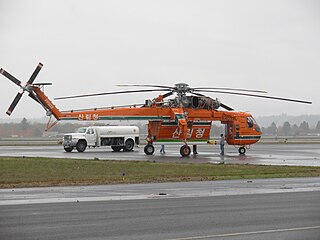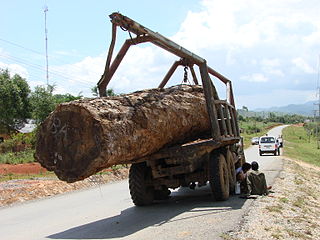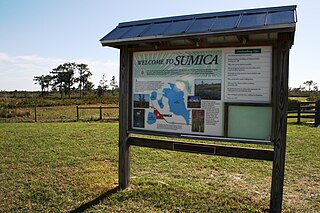
The economy of the Central African Republic is $2.321 billion by gross domestic product as of 2019, with an estimated annual per capita income of just $805 as measured by purchasing power parity in 2019.

The economy of Jamaica is heavily reliant on services, accounting for 71% of the country's GDP. Jamaica has natural resources and a climate conducive to agriculture and tourism. The discovery of bauxite in the 1940s and the subsequent establishment of the bauxite-alumina industry shifted Jamaica's economy from sugar, and bananas.

The economy of Malawi is $7.522 billion by gross domestic product as of 2019, and is predominantly agricultural, with about 80% of the population living in rural areas. The landlocked country in south central Africa ranks among the world's least developed countries. In 2017, agriculture accounted for about one-third of GDP and about 80% of export revenue. The economy depends on substantial inflows of economic assistance from the IMF, the World Bank, and individual donor nations. The government faces strong challenges: to spur exports, to improve educational and health facilities, to face up to environmental problems of deforestation and erosion, and to deal with the problem of HIV/AIDS in Africa. Malawi is a least developed country according to United Nations.

Bogalusa is a city in Washington Parish, Louisiana, United States. The population was 12,232 at the 2010 census. In the 2020 census the city reported a population of 10,659. It is the principal city of the Bogalusa Micropolitan Statistical Area, which includes all of Washington Parish and is also part of the larger New Orleans–Metairie–Hammond combined statistical area.

Plantations are farms specializing in cash crops, usually mainly planting a single crop, with perhaps ancillary areas for vegetables for eating and so on. Plantations, centered on a plantation house, grow crops including cotton, cannabis, coffee, tea, cocoa, sugar cane, opium, sisal, oil seeds, oil palms, fruits, rubber trees and forest trees. Protectionist policies and natural comparative advantage have sometimes contributed to determining where plantations are located.

UPM-Kymmene Oyj is a Finnish forest industry company. UPM-Kymmene was formed by the merger of Kymmene Corporation with Repola Oy and its subsidiary United Paper Mills Ltd in 1996. UPM consists of six business areas: UPM Fibres, UPM Energy, UPM Raflatac, UPM Specialty Papers, UPM Communication Papers and UPM Plywood. The Group employs around 17,000 people and it has production plants in 11 countries. UPM shares are listed on the NASDAQ OMX Helsinki stock exchange. UPM is the only paper company which is listed in the global Dow Jones Sustainability Index and also a member of the United Nations Global Compact organization.

Svenska Cellulosa AB is a Swedish timber, pulp and paper manufacturer with headquarters in Sundsvall. It has approximately 3,300 employees and a turnover of approximately SEK 20.8 billion. Its main products include many one-use paper products, containerboard, solid-wood products, pulp and forest-based biofuel. SCA is Europe's largest private owner of forest land, with 2.7 million hectares. The global hygiene product company Essity was part of SCA until 2017.

Illegal logging is the harvest, transportation, purchase, or sale of timber in violation of laws. The harvesting procedure itself may be illegal, including using corrupt means to gain access to forests; extraction without permission, or from a protected area; the cutting down of protected species; or the extraction of timber in excess of agreed limits. Illegal logging is a driving force for a number of environmental issues such as deforestation, soil erosion and biodiversity loss which can drive larger-scale environmental crises such as climate change and other forms of environmental degradation.

Mutare, formerly known as Umtali until 1982, is the most populous city in the province of Manicaland, and the third most populous city in Zimbabwe, having surpassed Gweru in the 2012 census, with an urban population of 224,802 and approximately 260,567 in the surrounding districts, giving the wider metropolitan area a total population of over 500,000 people. Mutare is also the capital of Manicaland Province and the largest city in eastern Zimbabwe.

The Korea Forest Service is a central administrative agency under the Ministry of Agriculture, Food and Rural Affairs (MAFR), responsible for protecting and nurturing forests, increasing forest resources, developing forest products, conducting research on forest management and improvement, and is located in Daejeon Government Complex. In the past, during the national forestation campaign from 1973 to 1986, it was temporarily under the Ministry of Home Affairs, but returned to the Ministry of Agriculture, Forestry and Fisheries in 1987. However, as the agency's work was focused solely on maintaining and managing successful national forestation policies, questions were raised about its necessity for a period of time. Currently, the agency has transformed its identity into one that strives to generate continuous income through forest resources.

Forestry in India is a significant rural industry and a major environmental resource. India is one of the ten most forest-rich countries of the world. Together, India and 9 other countries account for 67 percent of the total forest area of the world. India's forest cover grew at 0.20% annually over 1990–2000, and has grown at the rate of 0.7% per year over 2000–2010, after decades where forest degradation was a matter of serious concern.
The Russian forestry industry is a set of Russian industries related to wood harvesting and processing. As one of the oldest sectors in the country's economy, Russia's timber industry continues to bring in about $20 billion per year. Russia has more than a fifth of the world's forests, making it the largest forest country in the world. According to data for 2015, the total forest area has exceeded 885 million hectares, representing 45% of the total area of the country. The stock of wood in the area was 82 billion cubic meters.

Deforestation in Laos is a major environmental concern, with Laos losing forest area to legal and illegal logging.

HS Timber Group is an Austrian based company operating in the wood processing industry, lumber trading and bioenergy production. It is one of the leading woodworking business in Europe and employs more than 2,700 people in its headquarters and seven global production units.
The Finkbine-Guild Lumber Company was established to harvest and market the virgin longleaf pine stands of southern Mississippi during the early 20th century. The main sawmills were located in Wiggins and D'Lo, Mississippi. When the local timber supply dwindled, the company tried to utilize redwood trees from California, but that operation failed because of high transportation costs. Other attempts were made at promoting a more diversified use of the cutover timberlands; some ventures were successful while others were not.

Interfor Corporation is one of the largest lumber producers in the world. The company's sawmilling operations have a combined manufacturing capacity of over 5.2 billion board feet of lumber with sales to North America, Asia-Pacific and Europe. Interfor is based in Vancouver, BC and employs approximately 5200 people. In May 2014, Interfor opened its corporate office for the USA south-east region at Peachtree City, Georgia.

The history of the lumber industry in the United States spans from the precolonial period of British timber speculation, subsequent British colonization, and American development into the twenty-first century. Following the near eradication of domestic timber on the British Isles, the abundance of old-growth forests in the New World posed an attractive alternative to importing choice timber from the Baltic via the narrow straits and channels between Denmark and Sweden. The easily available timber proved an incredible resource to early settlers, with both domestic consumption and overseas trade fueling demand. The industry expanded rapidly as Americans logged their way across the country. In this pursuit, hundreds of thousands of indigenous peoples were displaced, murdered, and enslaved for the purpose of the timber industry.
L.N. Dantzler Lumber Company began as a small sawmill owned by William Griffin in Moss Point, Mississippi. L.N. Danzler bought it in the 1870s and, with two sons, incorporated the business in 1888. Originally, the main business was the manufacture of lumber from southern yellow pine, but in 1949, the company switched to tree farming of southern pines and sold timber by selective cutting to yield a variety of wood products. The family-owned business prospered for 75 years but was sold to International Paper Company in 1966.
The wood industry or timber industry is the industry concerned with forestry, logging, timber trade, and the production of primary forest products and wood products and secondary products like wood pulp for the pulp and paper industry. Some of the largest producers are also among the biggest owners of timberland. The wood industry has historically been and continues to be an important sector in many economies.

Sumica, alternatively written as SUMICA, was a mill town in Polk County, Florida, United States. The ghost town is commemorated by a historical marker off S.R. 60. There is also a Southwest Florida Water Management District preserve in the area named for the former logging settlement and mill town. Goods from a company store in the town could be purchased with company issued currency, including 25 cent and 5 cent scrip.
















